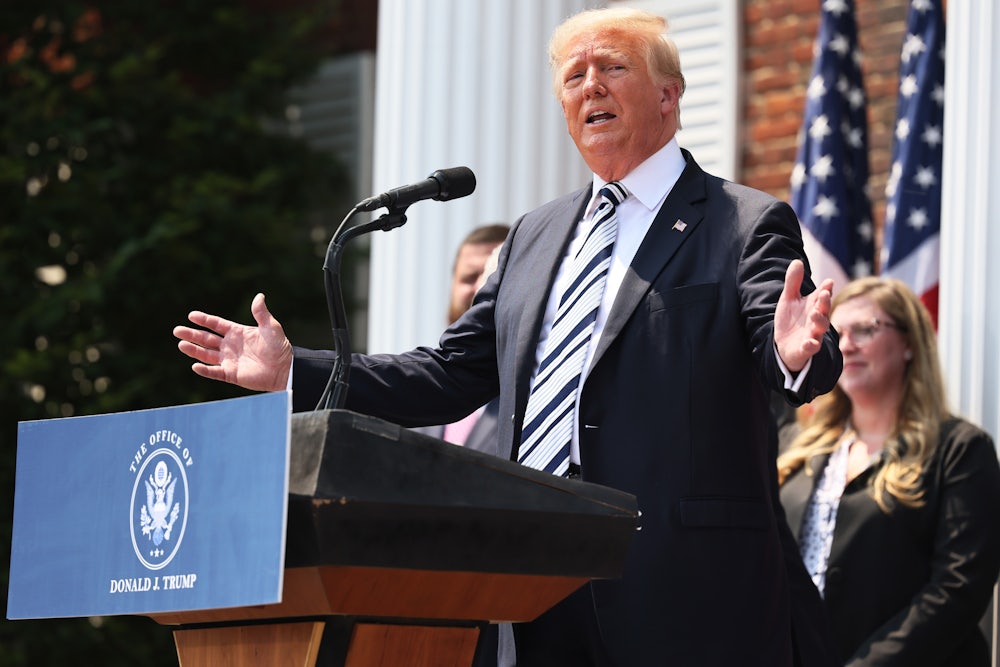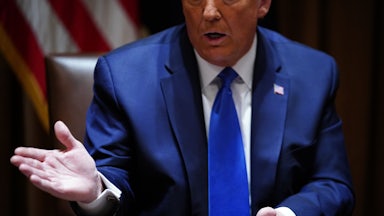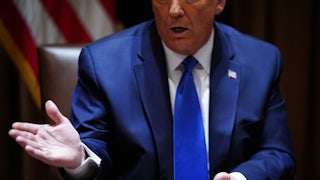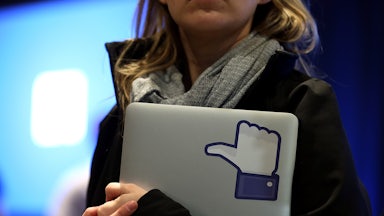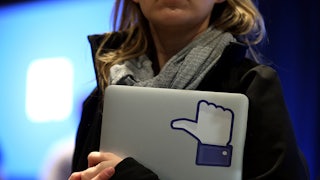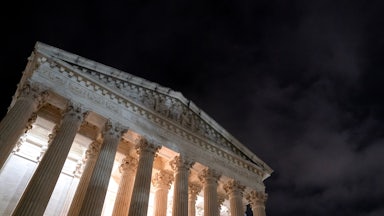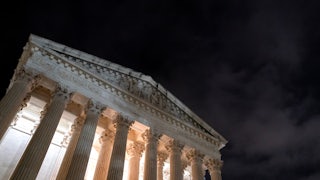“We’re going to hold big tech very accountable,” said former President Donald Trump on Wednesday. Holding forth in 91-degree heat in Bedminster, New Jersey, Trump introduced a class-action lawsuit against Twitter, Facebook, YouTube, and their parent companies’ CEOs, which he called “a very beautiful development for our freedom and freedom of speech.” Demanding punitive damages and that his social media accounts be restored—while also telling a questioner that he wasn’t sure whether he’d use them again—the forty-fifth president sketched out an apocalyptic vision of contemporary America as besieged by crime, fake news, a foreign virus that only he could control, and, most relevantly, censorious Silicon Valley tech giants allied with ruling Democratic elites. With this lawsuit, which Trump is recruiting people to join as members of the class, he hopes to tame the tech companies that have so far resisted meaningful regulation and humiliated the former president by revoking his posting rights. Or just generate attention, the currency of his career.
Trump’s appearance was typically rambling and barely coherent at times, landing on many of his favorite issues and outright lies (the medical efficacy of hydroxychloroquine got a shout-out). But it told us some important things about his postpresidency plans, the likely fruitless legal battle that MAGA conservatives are willing to wage against tech companies, and even some of the deficiencies in the present attempts to tame big tech. Trump’s class-action lawsuit is hardly, as he claims, “a pivotal battle in defense of the first amendment,” but it is very Trumpian: cynically capitalizing on a kernel of genuine populist discontent, dangerously manipulating public discourse, and doomed to fail in some heretofore unforeseen, embarrassing way. But most importantly, Trump now has a cause célèbre for which he can drum up millions in new donations.
As a spate of early commentators pointed out, Trump’s lawsuit may not have much of a shot in the courts, even if it ends up in front of a Trump-appointed Republican judge. As it is, Facebook’s Terms of Service dictate that all legal claims must be settled in court in a couple of northern California districts. (The former president’s lawyers, for what it’s worth, said that this issue should be decided by the Supreme Court.) The 44-page suit makes a bunch of bold and perhaps competing claims, and it has the linguistic feel of the kind of overheated lawfare that has become a staple of the MAGA right—documents designed to generate attention and political fundraising momentum as much as stake a legal claim.
But if you believe that by banning Trump and the few everyday Americans the initial class-action suit includes, social media companies represent an “imminent, severe, and irreparable” threat, then your time has arrived. If you go to TakeonBigTech.com, you can learn about how to join the suit. Trump has promised what could become a large class of suitors, led by a team of high-powered lawyers (veterans of lawsuits against Big Tobacco and O.J. Simpson)—which is really to say, he’s promised a circus, one that anyone with a sense of grievance and a suspended Facebook account can join.
What Trump, a god-tier narcissist, misses is attention, and the power that comes with wielding a social media megaphone that can be instantly activated to catalyze millions of people into potential action, from MAGA-heads to media stenographers who must report on his every utterance (guilty!). Taking on big tech—once simply a subject that could be invoked as a nod to conservatives’ latest grievance—has now become a matter of real strategic urgency to Trump, who reportedly declined to join Gettr, his adviser Jason Miller’s recently launched social media platform (which was almost immediately hacked). In his press conference, Trump acknowledged that his fame means that he can generate attention without a dedicated social media platform, but there are clear difficulties waiting in the long term, especially if he plans to run in 2024. He needs to be posting where his fans are, and Parler and Gab and Gettr are simply not the white-hot centers of MAGA activity that Facebook and YouTube are. Trump needs his old accounts back.
Here I reluctantly acknowledge the trace amounts of truth at the heart of Trump’s complaint. Social media companies wield too much power over speech; speech standards online seem wholly unsettled; and Section 230, the small but essential piece of legislation that has immunized internet companies from legal liability for what’s posted on their platforms, may be in need of some kind of reform, if not the abrogation that Trump seeks. And tech companies have shown themselves to be rather cooperative, at times, with the federal government in adjudicating online speech and surveilling users. It’s less clear whether this means, as Trump’s lawsuit claims, that Facebook is a “state actor” akin to a sovereign country, or that social media companies have become “the de facto censorship arm of the US government.” (Government subpoenas for tech user data have been the subject of intense but unpublicized legal battles.)
Notes of real concern, sure. But anyone who’s been on this ride for the last four-plus years knows that Trump works only for himself and that the bullshit quotient surrounding this affair will be noxiously high. However sluggish Congress’s ongoing antitrust efforts might be, they’re far more likely to yield productive results than a stunt lawsuit initiated by an attention-starved ex-president desperate to regain relevance and control over the distribution of his message. Trump’s press conference was the old insult comic back at the mic, working on familiar, crowd-baiting material. (“George Washington—he will not be canceled.”) You’d have to be a true believer to be taken in by the same tired pageantry.
As if Trump’s overriding motives weren’t clear, there were occasional moments of unintentional revelation in his latest public address. “Big tech happened to choose the wrong side,” said Trump. “And they banned the right side.” In his mangled locution, what that means is not that we need better legal rules of the road or more tech competition or a devolution of power away from corporate giants and toward users. It’s something much simpler, a purely Manichean judgment: Big Tech is the enemy because it doesn’t serve Trump. This was always the mafioso-like logic at the heart of Trumpism, and its latest expression could not be more garishly clear. However Trump’s lawsuit ends, it started out of venal self-interest. The most interesting question to be settled might be who, beyond a few paid-up operatives and MAGA cultists, still thinks otherwise.
